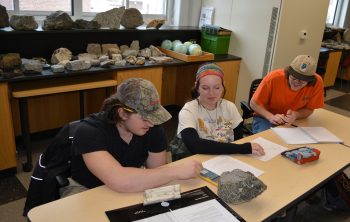FARMINGTON, ME (February 7, 2024)—Climate change and excess CO2 in the atmosphere poses a threat here in Maine and around the world. Undergraduate student researchers at the University of Maine at Farmington and their faculty mentor, Doug Reusch, professor of Geology, have found a possible way to minimize it—deep in the ocean.
Kayleigh Brisard, from Mercer; Gil Hamilton, from Euclid, Ohio; and Carson Theriault from Fort Kent are all seniors at UMF majoring in Earth and Environmental Sciences. A year ago, they started their research, under Reusch’s guidance, reading peer-reviewed science articles on carbon sequestration to look into how excess CO2 can be stored to lessen its effects.
The more they learned, the more important it became to share it with others, and Reusch suggested they work on an article for a scientific publication.
“Scientific writing is pretty challenging,” said Hamilton. “But the professional scrutiny we received only helped us get better at it.”

UMF student researchers (left to right) Gil Hamilton, Kayleigh Brisard and Carson Theriault explored articles on carbon sequestration to look into how excess CO2 can be stored to lessen its effects.
The group’s research, “A Transformative Carbon Sink in the Ocean?”, was recently published by Eos, an award-winning science news magazine. It contributes another potential solution to the world’s ongoing climate change problem.
“This has been such a cool learning experience,” said Brisard. “As students, we didn’t know much about the publishing process. Our article had to go through reviewers, editors and an in-depth evaluation process. We didn’t know what to expect, but we’re all super excited with the results.”
Their research explored how excess carbon dioxide in the atmosphere can have dangerous consequences, as we have all seen, such as extreme heat, stronger storms and more intense floods and droughts. While lowering CO2 levels will require a range of actions, the students investigated whether certain ocean rocks can help to lock carbon dioxide into mineral carbon while also deacidifying the ocean water.
They learned Earth’s mantle contains a vast amount of this ultrabasic (antacid) rock, which is typically buried under kilometers of the Earth’s crust. However, in places under the ocean where this rock is accessible due to fracturing, the natural process of locking dissolved carbon into mineral carbon occurs at some hydrothermal vents.
The student research examined whether it is possible to use this natural carbon dioxide removal (CDR) process and enhance it by expanding these ocean hydrothermal systems through drilling to help draw down atmospheric CO2. Additional research would be needed to investigate the feasibility of this approach and identify possible testing sites. However, the core technologies needed are already available and should be doable when taking into consideration the current expansive existing fossil fuel infrastructure.
“The goal of our Earth and Environmental Sciences program is to have our students career-ready as they explore real-world problems through field work and original research. These students started their journey early in their time at UMF with introductory field work and close collaboration with their professors. Now as seniors, they have co-authored an original research project that has been published in a scientific journal available to more than half a million advocates, policy makers and professionals in the Earth and space sciences worldwide,” said Reusch.
“Being involved in professional-level research with a real world problem changes your perspective,” said Carson. “It made me realize I can be successful with my career aspirations. It opened the door for me.”
More on University of Maine at Farmington
A nationally recognized public liberal arts college known for its commitment to the creative arts, teacher preparation, the health arts and sciences, the environment, business and public service, UMF provides a challenging yet supportive environment to prepare students for both careers and further study. Located in the heart of Maine’s four-season outdoor recreational region, UMF is a welcoming, close-knit academic community that prepares students for enriching professional careers, engaged citizenship and an enduring love of learning.
# # #
EDITOR’S NOTE:
Image: https://www.umf.maine.edu/wp-content/uploads/sites/1/2024/02/RP234-037-scaled.jpg
Photo Caption: UMF student researchers (left to right) Gil Hamilton, Kayleigh Brisard and Carson Theriault explored articles on carbon sequestration to look into how excess CO2 can be stored to lessen its effects.
Photo Credit: UMF Photo

